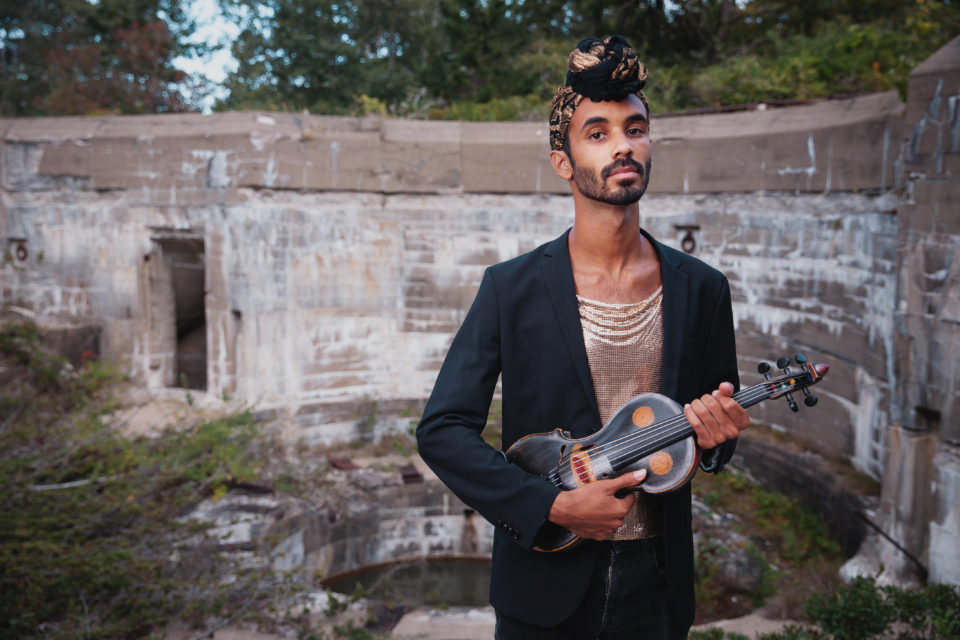Audio Transcript:
Intro: Jewly Hight here on WNXP with a Singled Out feature on Jake Blount’s version of the very old song “Death, Have Mercy.” That’s part of his album, The New Faith, which is our record of the week, and probably the first old-time, Afrofuturistic concept album you’ve ever encountered. Blount is a scholar and performer of Black folk music, and he and his co-producer, Brian Slattery, thoroughly re-imagined spirituals that he learned from ancient-sounding, a cappella field recordings and wrapped a story around them. Blount presents the songs as the new creed of a small community of Black Americans that has survived a future environmental apocalypse, and has reason to fear death. Instead of picturing a future with gleaming hovercrafts, he sets a scene where there’s no more electric grid, only primitive technology to rely on. And as he translates between different forms of technology, he unearths new knowledge in a song sung by Vera Hall long, long ago, and incorporates much more recent Black musical traditions. Think: rhyming bars and disco balls. It’s a whole new, old world.
Jake Blount: Part of reading text, as someone whose history and cultural perspective throughout time has been erased, is using what you know about your culture and your lineage to decode messages that might still be embedded in there, that are lost.
So I’ve been listening to this song for a long time, which means I’ve been through a couple of different eras of music consumership. And now oftentimes I’m listening on a phone. So I pulled it up on YouTube right now. Oh, great, there’s a jewelry ad. Folklore, everybody. [laughs]
[music: Vera Hall’s “Death Is Awful” featuring Dock Reed]
But I also knew somewhere in the back of my mind that she’d recorded it another time by herself, with the title “Death Have Mercy.” And I wound up using that refrain, because I felt it pulled out some more of the subtext in the rest of the song.
[music: Vera Hall’s “Death, Have Mercy”]
When I listen to this song, one of the things that’s most fascinating to me about it is that it’s a conversation with death personified. The way that that encounter is described in the verses is quite striking to me: “If I was a flower in my bloom/what make death cut me down so soon.” That one seems fairly straightforward. And then the last verse kind of crack the code for me: “This is the way that death begins/Close your eyes and stretch your limbs.” And I was like, “Oh, this is a song about a carnal union with a death god.” And that is just wild to me, to think about it in that way. I don’t know whether she thought about it that way. It’s a very different perspective on the theology. And I knew I wanted to pull that out. I wanted that reading to be apparent.
I thought a lot about her vocal ornamentation, where those little runs are, and I tried to keep as many of those as I could. But she’s way better at that than me.
[Blount singing a capella] Oh, death have mercy/Oh, death have mercy
So there were spots that I had to let go of it, because it was going to be bad if I didn’t.
Then it was about how to preserve the things I really love from that recording, while expanding on the sound. The first instrument was the kick drum. So I started singing the song [stomps quarter notes with his foot] and I went, “Oh! That’s the beat.” So Brian went, “Okay,” and we recorded a kick drum making that rhythm. And then the next thing Brian did was just pick up his bass and go, “dum da dum dum.” So it turned into this very house music, disco music-esque thing, because I felt like we didn’t have anything that represented particularly the queer, Black elements of pop music in recent history, which are so enmeshed in house and disco and things like that. I wanted that sound to be present, even though so much of that is so digital that I couldn’t remake it in a way that was super close.
I pulled out this nylon string banjo. You know, it sounds a little bit older. [plays circling banjo figure] And then I put the string parts together to go over top of it. The strings came more out of the disco side of what was happening, where I was thinking about some disco songs that I really like and how periodically, you know, the strings are just in charge.
[Demeanor rapping] Falling into you like I resolve something new/like I belong in dispute.
I knew that rap had to be a part of the project in a big way, and I knew Demeanor would be the right guy to do it. I mean, it’s hard to find a rapper that you can send this banjo track to and be like, “Make a verse to this.” But I knew he could do it because he’s done it before. You know, he grew up around this stuff. He knows what it’s all about.
[Demeanor rapping] My entire mind and body, for sure toughened/You got to love it.
I was pretty much hands off in what he chose to say during his verses, but had thoughts about, you know, “Probably you’re not going to use profanity, because it’s still a religious service, even if it’s a future one. So, maybe don’t go there.” My idea was that this was the music of people who had made that journey, their descendants, and they’ve retained these songs and retained lessons that were passed down to them with the songs. But because they’ve been isolated, because times have changed and their world experience is so different, it’s turned into something very different than it was.

